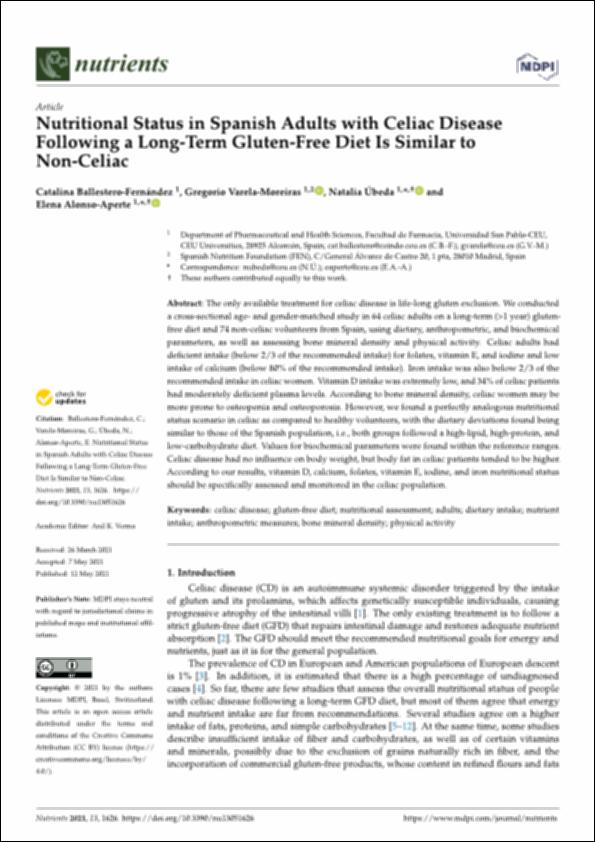Please use this identifier to cite or link to this item:
http://hdl.handle.net/10637/15037Nutritional Status in Spanish Adults with Celiac Disease Following a Long-Term Gluten-Free Diet Is Similar to Non-Celiac
| Title: | Nutritional Status in Spanish Adults with Celiac Disease Following a Long-Term Gluten-Free Diet Is Similar to Non-Celiac |
| Authors : | Ballestero Fernández, Catalina Varela Moreiras, Gregorio Úbeda Martín, Natalia Alonso Aperte, Elena |
| Keywords: | Celiac disease; Gluten-free diet; Nutritional assessment; Adults; Dietary intake; Nutrient; Intake; Anthropometric measures; Bone mineral density; Physical activity |
| Publisher: | MDPI |
| Citation: | Ballestero-Fernández C, Varela-Moreiras G, Úbeda N, Alonso-Aperte E. Nutritional Status in Spanish Adults with Celiac Disease Following a Long-Term Gluten-Free Diet Is Similar to Non-Celiac. Nutrients. 2021 May 12;13(5):1626. doi: 10.3390/nu13051626 |
| Abstract: | The only available treatment for celiac disease is life-long gluten exclusion. We conducted a cross-sectional age- and gender-matched study in 64 celiac adults on a long-term (>1 year) glutenfree diet and 74 non-celiac volunteers from Spain, using dietary, anthropometric, and biochemical parameters, as well as assessing bone mineral density and physical activity. Celiac adults had deficient intake (below 2/3 of the recommended intake) for folates, vitamin E, and iodine and low intake of calcium (below 80% of the recommended intake). Iron intake was also below 2/3 of the recommended intake in celiac women. Vitamin D intake was extremely low, and 34% of celiac patients had moderately deficient plasma levels. According to bone mineral density, celiac women may be more prone to osteopenia and osteoporosis. However, we found a perfectly analogous nutritional status scenario in celiac as compared to healthy volunteers, with the dietary deviations found being similar to those of the Spanish population, i.e., both groups followed a high-lipid, high-protein, and low-carbohydrate diet. Values for biochemical parameters were found within the reference ranges. Celiac disease had no influence on body weight, but body fat in celiac patients tended to be higher. According to our results, vitamin D, calcium, folates, vitamin E, iodine, and iron nutritional status should be specifically assessed and monitored in the celiac population. |
| URI: | http://hdl.handle.net/10637/15037 |
| Rights : | http://creativecommons.org/licenses/by-nc-nd/4.0/deed.es |
| ISSN: | 2072-6643 |
| Issue Date: | 12-May-2021 |
| Center : | Universidad San Pablo-CEU |
| Appears in Collections: | Facultad de Farmacia |
Items in DSpace are protected by copyright, with all rights reserved, unless otherwise indicated.


